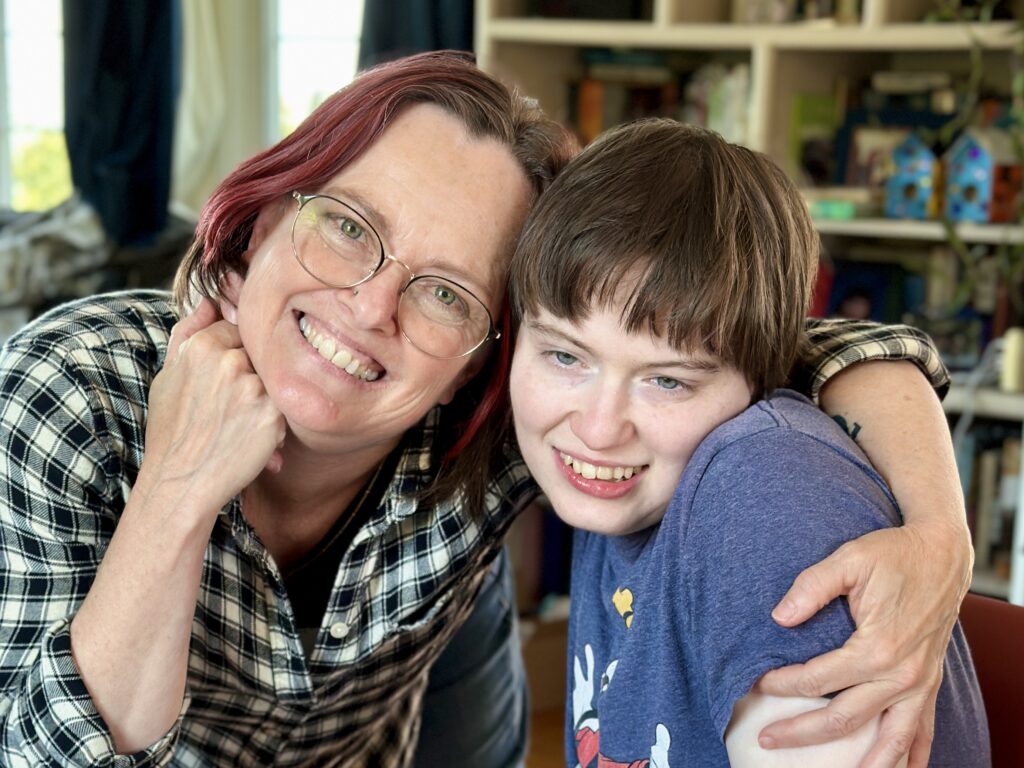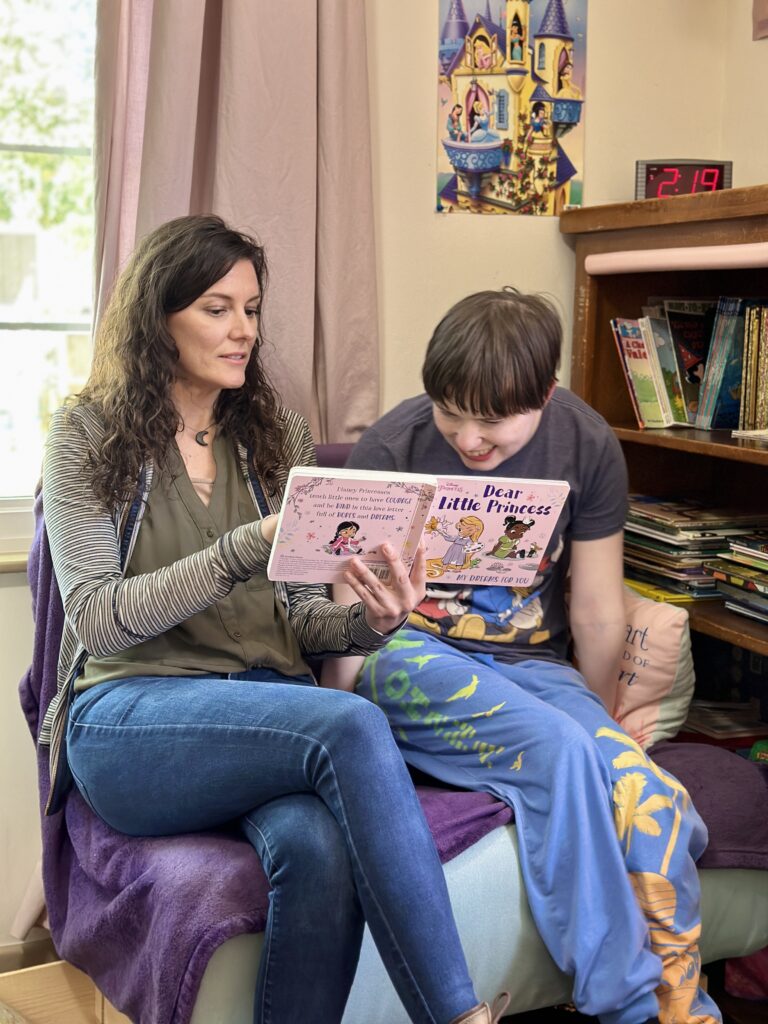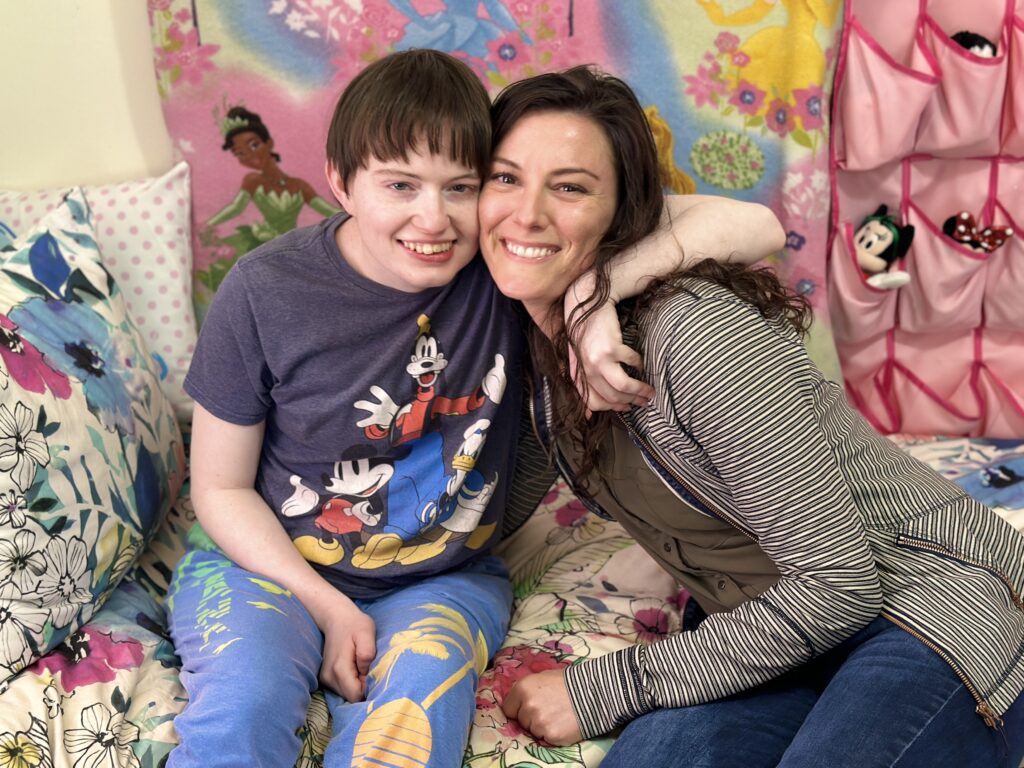Palliative Care team supports Rhiannon and her mom Terena
 For Terena Scott, parenting her daughter Rhiannon has been a long and winding road. As early as Rhia’s first year of life, Terena knew that her development was unusual.
For Terena Scott, parenting her daughter Rhiannon has been a long and winding road. As early as Rhia’s first year of life, Terena knew that her development was unusual.
When Rhia was six, doctors diagnosed her with cerebellar atrophy, which included delayed development. A decade later, they discovered it was caused by a rare mitochondrial disorder that is not fully understood and has no treatment. The disease has since caused Rhia to lose most of her hearing and sight; ataxia (poor muscle control) makes walking, eating, and other daily activities a challenge.
Yet Terena and her daughter exude positivity. They have the same winning smile, share silly jokes via sign language, and are among the most determined people you will meet.
Terena, a special education teacher and writer, says, “I’m the kind of person who’s like, ‘All right, let’s figure this out!’”
Figuring things out for Rhia has been challenging. Physicians still don’t know what type of mitochondrial disease she has. Rhia is now part of the Undiagnosed Diseases Network, which convenes clinical and research experts to solve challenging medical mysteries.
“All we know is that her disease is degenerative,” says Terena. “We don’t know how much more time she has.”
After years of driving from their home in Ukiah for Rhia’s appointments at Stanford, the pair moved to the Bay Area to be closer to support services. They are grateful that they found palliative care with Mission Hospice.
“In fall of 2021, Rhia was in significant decline,” says Terena. “I didn’t know what was going on, and I was scared; I went online looking for resources. My friend called Mission Hospice, and within an hour we had scheduled an appointment. Within a week we had help.”
“People think of palliative care as symptom management, but it’s so much bigger than that. Part of it is mental health. Having the Mission Hospice team helps me not feel so alone. I can text (Nurse Practitioner) Michele (Cronin) with medical questions, talk to (Social Worker) Lucia Hollowell about the stress – it means so much.”
Rhia’s symptoms are so severe that no day program will admit her, so she is largely confined to her home in Belmont. A caregiver spends the day with her while Terena works, and visits from her two Mission Hospice volunteers are highlights of her week.
 Volunteer support for the family is so important, Mission Hospice matched Rhia with not one but two volunteers – both of whom are uniquely suited for this assignment. These volunteer visits provide important socialization for Rhia, who her mom says is “a social butterfly.”
Volunteer support for the family is so important, Mission Hospice matched Rhia with not one but two volunteers – both of whom are uniquely suited for this assignment. These volunteer visits provide important socialization for Rhia, who her mom says is “a social butterfly.”
Volunteer Melissa Stueve, a former audiologist, has a background in speech pathology and knows sign language – all useful in her work with Rhia. She says their weekly visits typically include a ritual of selecting and reading some books, coloring together, and organizing her collection of stuffed animals.
“I always have a good time hanging out with her,” says Melissa. “Rhia has a great sense of humor and loves to laugh with me. I feel so privileged to be let into their home and given an opportunity to visit. Sometimes we color, sometimes we read; either way, I know it will be a bright spot in my day.”
Volunteer Amanda Kanaday, who works as a registered behavioral technician, says that “volunteering with Mission Hospice has given me a sense of my purpose in the world. It made me realize this is what I want to do with my life.” In addition to her full-time job, she’s now studying for her Master of Social Work (MSW) degree – and still makes the time to volunteer.
“I’m so blessed and grateful that I get to work with everyone at Mission Hospice,” Amanda says. “Rhia is the sweetest person you could ever meet. She’s just the light of your life.”
In addition to being a companion for Rhia, Amanda has become an important part of Terena’s support system – checking in on her emotions and what she needs for support. They connected over many things, including a love of dance and yoga, as well as the discovery that they lived in Ukiah at the same time, but didn’t know each other.
 Terena would be the first to say that living with a medical mystery is overwhelming. The stress and uncertainty pile up, and having the Mission Hospice palliative care team on their side helps both of the women keep their amazing smiles.
Terena would be the first to say that living with a medical mystery is overwhelming. The stress and uncertainty pile up, and having the Mission Hospice palliative care team on their side helps both of the women keep their amazing smiles.
“Even though Rhia doesn’t fit into any boxes,” says Terena, “Mission Hospice said, ‘let’s see what we can do.’ I just appreciate so much their willingness to try. It all helps me not feel so alone – that’s huge. And Rhia just loves Amanda and Melissa.”
Years ago, doctors told Terena that her daughter would be lucky to live to 20. Rhia just celebrated her 28th birthday; Melissa joined in the festivities, as did Cinderella –a special treat for the birthday girl, who loves princesses.
Terena has learned to celebrate what they can. “I’ve made peace with the fact of Rhia’s death,” she says. “I’m more afraid that she will suffer. Her speech is so slurred that sometimes even I can’t understand her. Her hands are so shaky she rips her beloved books. I’m afraid she’s going to lose more and more of what she loves, and I will not be strong enough to help her with that.”
“Mission Hospice helps me manage stress, allows me the chance for some self-care, and just helps make this less overwhelming,” says Terena. “I don’t feel like I’m battling this all by myself.”
Terena is finishing a memoir of Rhia’s first 18 years, Raising Rhia, and blogs at TerenaScott.wordpress.com.
